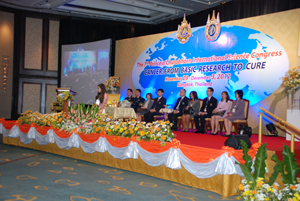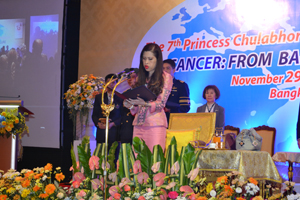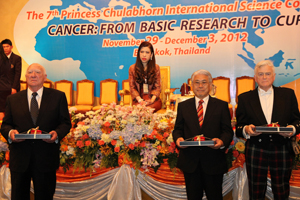Princess Chulabhorn International Science Congress (PC) Program
The Seventh Princess Chulabhorn International Science Congress (PC VII)
Congress Theme: Cancer: From Basic Research to Cure
29 November - 3 December 2012
Shangri-La Hotel, Bangkok, Thailand
The Princess Chulabhorn Gold Medal Award
Professor Dr. Her Royal Highness Princess Chulabhorn established the “Princess Chulabhorn Gold Medal Award” to honor world-renowned individuals or organizations whose work has received international acclaim. Importantly, recipients shall have provided important and sustained support to the advancement of science in developing countries. In 2012, the award presentation was a special ceremony held at the close of the Seventh Princess Chulabhorn International Science Congress.
The awardees were:
Dr. John H. Duffus, Director of the Edinburgh Centre for Toxicology, U.K.
Dr. Duffus’ involvement in environmental toxicology began in 1973, when he was asked to advise on prevention of toxic hazards for fish and human consumers from the possible discharge of metals near fishing grounds. He also introduced new courses in toxicology at the Heriot-Watt University. The subsequent publication of his pioneering textbook on “Environmental Toxicology” led to an invitation from the WHO Regional Office for Europe to become their main consultant on Manpower Development for Chemical Safety under the International Programme on Chemical Safety (IPCS), at which time he prepared a strategy for developing courses and curricula in toxicology, and organised short international courses in toxicology and risk assessment in different countries, including Thailand. Through his significant contributions to training programs organized by CRI, his work in environmental toxicology has had an extensive and lasting impact on human resources development and sustainable development in South East Asia.
During his distinguished career in Toxicology, Dr. Duffus has authored or contributed significantly to more than 200 major publications and has received extensive support from the UK Research Councils and the European Commission, while contributing to IPCS, WHO, and UNEP Chemicals. He is currently active in developing approaches to risk assessment of toxicity of metals that take into account their chemical speciation.
Professor Minoru Isobe, Professor Emeritus of Nagoya University and Chair Professor, National Tsing Hua University, Taiwan.
Professor Isobe is recognized worldwide as a leading authority in Organic Chemistry in general, and Organic Synthesis in particular, as well as Natural Products Chemistry and Bioorganic Chemistry. His most notable fields of research are the total synthesis with stereo chemical control of very complex natural products and bioorganic chemistry of bioluminescence, marine toxins, insect hormones, ion selective ionophore, and chemical biology of molecular interaction between natural products and target proteins. He is the author of over 300 original research articles and more than 80 review articles and books, and has long been involved with the International Union of Pure and Applied Chemistry (IUPAC), including as IUPAC Division President of Organic & Biomolecular Chemistry, and IUPAC Task Group Chair of a project on “Strategic Planning for a new East Asian Network for Organic Chemistry”.
Since 1987, Professor Isobe has made outstanding contributions to human resource development in chemical science for Thailand, training many Thai Ph.D. students, postdoctoral fellows and short term visiting scientists, including many from CRI. He is the initiator and founding member of the very successful Asian Core Program: Cutting Edge Organic Chemistry in Asia, and has participated in 6 out of 7 occasions in the Princess Chulabhorn International Science Congress Program. He is also a visiting professor at the Chulabhorn Graduate Institute.
Professor Gerald N. Wogan, a Visiting Professor, Department of Environmental Health, Johns Hopkins University, and Senior Research Fellow, Laboratory of Human Carcinogenesis, U.S. National Cancer Institute, National Institutes of Health.
Professor Wogan’s seminal contribution to science and human health is the development of a new paradigm for demonstrating the impact of an environmental contaminant on human health. He followed that paradigm to its ultimate end, which is the prevention of the toxic effect in a human population. With his longtime collaborator, Dr. George Buchi, he was able to isolate, purify and determine the structure of aflatoxin, and subsequent studies on metabolism and carcinogenicity allowed the characterization of the structure of the DNA adducts, which could be used as biomarkers of exposure. These studies led to the discovery that aflatoxin was a major cause of liver cancer in Asia and Africa. This paradigm for aflatoxin became widely adopted as the model for conducting human epidemiology studies on environmental toxins.
Professor Wogan was elected in 1977 to the US National Academy of Sciences, and is the author of over 200 key scientific research papers. He is a greatly revered adviser to CRI, with his first contribution to the development of research in Thailand being the MIT-Thai program founded in 1977 to address the health problem of liver cancer that affected much of the developing world. He has also been instrumental in making it possible for Thai graduate students to receive research training at MIT, John Hopkins or Harvard laboratories as part of their postgraduate education.


